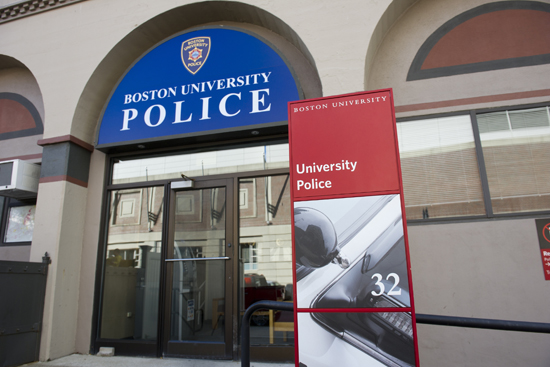Crime, but Not Partying, Down on Charles River Campus
Number of students referred for alcohol, drug violations spikes in 2012

The Boston University Police Department reports a slight drop in crime on the Charles River Campus in 2012. Photos by Cydney Scott
Overall, crime was down slightly on the Charles River Campus in 2012 compared to the previous year, but it probably didn’t seem that way in the dorms.
The number of students referred to the Judicial Affairs Office (JAO) for on-campus liquor or drug law violations jumped by nearly 30 percent in 2012, although arrests for those offenses either dropped dramatically or remained static, according to Boston University’s Annual Security and Fire Safety Report, issued last month.
The annual report is required under the Clery Act, which was passed in 1990 and requires all colleges and universities that participate in federal financial aid programs to disclose information about crime on or near their campus. BU’s report covers criminal activity on both the Charles River and the Medical Campus—ranging from forcible sex offenses and aggravated assault to robbery and arson. The Boston University Police Department creates the report from its records and those of the JAO and Residence Life and security officials, as well as neighboring police departments in Boston, Brookline, and Cambridge. In addition to reporting criminal activity, the report details fires in residential housing, describes University policies on such things as sexual harassment and alcohol and drug use, and suggests crime prevention strategies.
BUPD Sergeant Daniel Healy, who is in charge of Clery reporting, says he doesn’t see “anything really out of the ordinary for this year,” but he does point to the rising number of reports for alcohol and drug violations.
According to the report, 572 students were referred to the JAO for liquor law violations, compared to 520 in 2011. Arrests for the same offense, however, plummeted from 102 to 36. Healy thinks the drop in arrests is partially due to the fact that “patrols’ attention was slightly diverted to more violent crime,” like the string of robberies bordering BU early last fall. The number of arrests could rise again this year with the Boston Police Department’s recent installation of a new zero-tolerance policy for underage drinking.
Meanwhile, another 70 students were referred to JAO for drug law violations in 2012, compared to 59 the previous year. Arrests for the offense remained relatively static. Most of the alcohol and drug incidents occurred in BU housing.
Aggravated assault on the Charles River Campus more than doubled, from four incidents in 2011 to nine in 2012, with two-thirds occurring on neighboring public property.
Reported forcible sex offenses increased slightly, from 9 in 2011 to 10 in 2012. Nearly all of those occurred on campus. Following Congress’ reauthorization this year of the Violence Against Women Act, Healy expects next year’s report to provide more detailed information on sexual assault, stalking, and domestic and dating violence.

Reported burglaries and robberies dropped drastically. BUPD recorded 46 burglaries in 2012, compared to 63 in 2011. And just 4 robberies were reported on campus or public property last year, compared to 13 in 2011. That low number may seem odd considering last fall’s robbery spree that put the entire BU community on edge for two weeks. But because most of those incidents did not occur on campus or on abutting public property, BU is not required to report them under the Clery Act.
The University is also not required to report on larceny, which is the theft of personal property without the use of force. That means the 76 bicycles reported stolen to the BUPD in 2012 do not appear on the report either. Bike theft had been on a downslide from a peak of 115 in 2010, but appears to be on the rise this year, with 70 reported stolen by the end of September.
BUPD began reporting on hate crimes in 2011, when four incidents were reported on the Charles River Campus. In those cases, students were discriminated against based on their race, religion, or sexual orientation. In 2012, two such crimes were reported targeting students’ sexual orientation and ethnicity or national origin. While the intimidation in this type of crime usually occurs through social media, Healy says it can also come in the form of verbal slurs and vandalism.
As to fires in residential housing on the Charles River Campus, the report lists 11 incidents in 2012, up from 8 in 2011. Most were related to cooking mishaps and ranged in damage from $150 to $1,000.
Meanwhile, crime on the Medical Campus nearly doubled, from 6 incidents in 2011 to 11 in 2012. BUPD reported four arrests for drug law violations on public property, compared to only one the year before. And two motor vehicle thefts were recorded, one on campus, another on public property—none had been reported the previous year.
Healy, who is also the BUPD’s Medical Campus patrol supervisor, says these numbers reflect more detailed reporting by the Boston Police Department and not necessarily an increase in local crime.
He advises students, faculty, and staff to use these annual reports as a resource, pay close attention to BU alerts, and call the BUPD when they see something fishy.
“Report anything suspicious to the police right away,” Healy urges. “We’d always rather take 15 calls where we’re chasing something suspicious than one call on something that slipped by.”
Reach the Boston University Police Department at 617-353-2121.
Comments & Discussion
Boston University moderates comments to facilitate an informed, substantive, civil conversation. Abusive, profane, self-promotional, misleading, incoherent or off-topic comments will be rejected. Moderators are staffed during regular business hours (EST) and can only accept comments written in English. Statistics or facts must include a citation or a link to the citation.